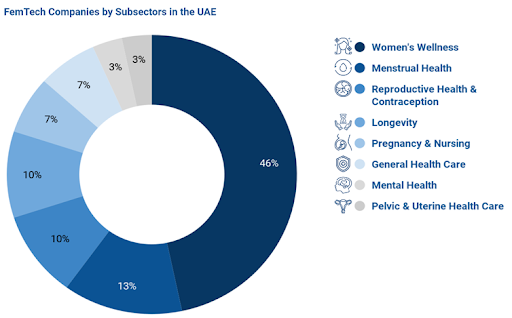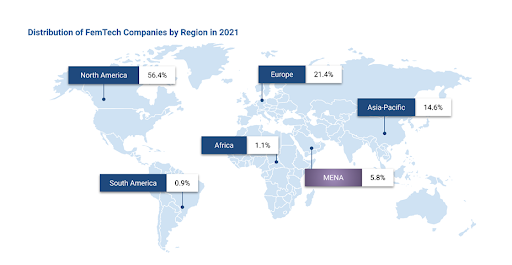One-third of Mena’s femtech companies are based in the UAE

Kate Batz is the director of FemTech Analytics, managing partner at Longevity Capital as well as director of strategy and business development at Deep Knowledge Ventures, Aging Analytics Agency and Deep Knowledge Analytics.
Healthcare subsectors catering specifically to the needs of women are few and far between. Today, only 4 per cent of investments in life science focus on healthtech solutions for women. However, the rapidly evolving femtech industry is coming to the rescue.
At FemTech Analytics, a strategic analytical agency focused on the emerging femtech sector and a subsidiary of UK-based consortium Deep Knowledge Group, we view femtech as software, diagnostics, products and services that use technology to focus on women's health and wellness. Femtech encompasses several sub sectors such as women's wellness, menstrual health, reproductive health and contraception, longevity, pregnancy and nursing, general health care, mental health, and pelvic and uterine healthcare.

These sub sectors are being developed through a wide range of technological innovations including tech platforms such as apps and telehealth, deepTtch such as AI and big data, as well as devices such as wearables, sensors and remote patient monitoring. Globally, pregnancy and nursing and reproductive health represent approximately 50 per cent of the overall femtech market.
The femtech industry emerged nearly 10 years ago. However, a wide range of aspects of female health remain underserved. While reproductive health and nursing has traditionally been the focus of femtech businesses and investments, several other sub sectors are gradually coming to the fore.
While femtech still focuses mostly on traditional technology sub sectors related to women’s health, the industry is expanding in scope to encompass other sub sectors such as mental health and longevity, which represents another emerging field focused on healthy aging including technologies and software to improve women’s healthspan and lifespan. The longevity industry presents solutions for the detection, monitoring and treatment of chronic diseases along with biometrics and lifestyle solutions. By developing and advancing healthtech, longevity and mental health solutions, femtech seeks to serve some of the most unmet healthcare needs of women.
Today more than ever, technologies aimed at improving the mental and emotional aspects of women's lives are essential. These solutions help women overcome stress, possess empathy, make the right choices and empower others.

In 2021, we conducted a number of case studies on the global femtech industry, profiling companies, investors and government agencies based on their innovation potential and business activity. Several countries have been advancing their femtech agendas in line with their women empowerment policies. According to our global FemTech Industry report 2021, the US is the global leader in femtech, while the UK and Israel boast the highest number of femtech companies in their respective regions. Asia's undisputed leader is India, which accounts for 5 per cent of femtech companies.
Examining the UAE and the wider Middle East and North Africa region (Mena), our recent report titled ‘FemTech Industry in the UAE’ showed that Mena’s share of the total number of femtech companies barely reaches 6 per cent. On a more granular level, the report presents the current state, recent developments, trends, industry innovations, technologies, market size and short-term projections of the emerging femtech market in the region.
One-third of Mena’s femtech companies are based in the UAE, where innovation, women empowerment and gender equality are matters of national priority. Approximately 60 per cent of UAE-based femtech companies are addressing women’s wellness and menstrual health, however, companies focusing on sexual health and menopause care are virtually nonexistent.
The UAE’s national strategy for women empowerment and its Gender Balance Council work to enact policies that support women at various levels. The country continues to prioritise women’s health by accelerating the growth of femtech. The Abu Dhabi Health Services Company (“SEHA”), the UAE’s largest healthcare network, has recently upgraded its Corniche Hospital to enhance patient experience and streamline the continuum of care. By doing so, the country is demonstrating a high calibre of governance, leading by example regionally and globally.
The nation has emerged as a global powerhouse of education, business and community for women, accelerating equality, diversity and inclusion across the public and private sectors. There is a constant growth of female representation in the UAE government and across industries nationwide. This socio-economic transformation is creating a solid foundation for femtech. The potential to further propel femtech development lies in bringing other underserved femtech sub sectors into focus.
Furthermore, the UAE is well-positioned to achieve exponential growth within the femtech industry, considering the array of existing startups providing feminine hygiene products and educational tools such as Pectiv, Orgabliss, MyLily and LiZZOM, and the several more expected to arise over the coming few years. Some of our report’s key findings came as no surprise - for instance, e-commerce platforms focused on women’s healthcare represent a key driver of the UAE’s femtech sector.
However, most investors in the Mena region are men, and the lack of understanding of female healthcare needs makes them reluctant to invest in female-related products. In addition, most femtech startups in the UAE are founded and led by women, who tend to receive less funding than their male-led counterparts. Despite the increasing interest from governments, entrepreneurs and investors in recent years, the industry remains underestimated and brimming with potential.


